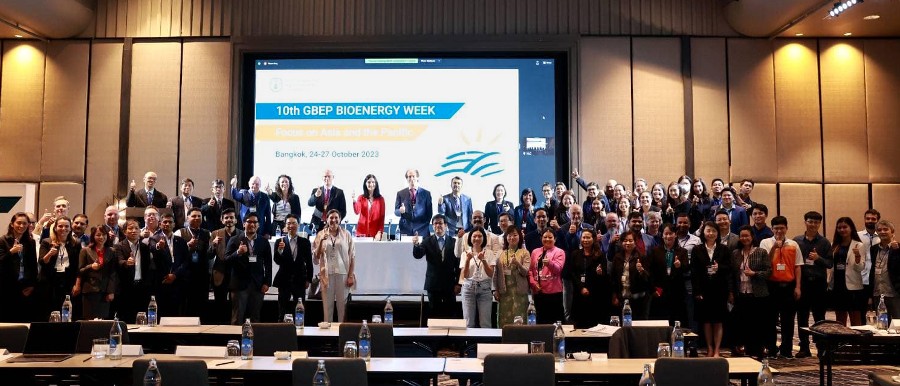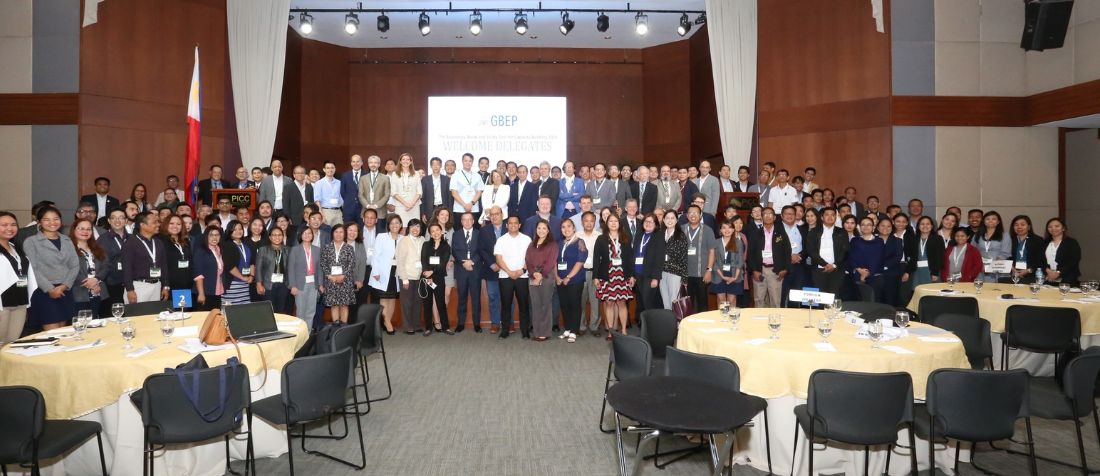Fostering sustainable bioenergy for climate goals and food security: highlights from the 10th GBEP Bioenergy Week

Bioenergy offers opportunities for improving access to clean energy, while diversifying agricultural production, generating new income streams and reducing emissions. Its production and use are growing with the hope to achieve sustainable development, climate change mitigation, and food and energy security.
Since 2013, the GBEP GBEP Bioenergy Weeks Weeks have gathered bioenergy experts, decision-makers and private sector representatives to discuss current trends, best practices and challenges in the bioenergy sector, and promote knowledge exchange.
This year, the 10th Bioenergy Week was held in Bangkok, Thailand, from 24 to 27 October, and was especially focused on the Asia-Pacific region, where bioenergy is a key component for meeting soaring energy demand while achieving net-zero targets.
The event was organized by the Food and Agriculture Organization of the United Nations (FAO) in the context of the Global Bioenergy Partnership, hosted by the Department of Alternative Energy Development and Efficiency (DEDE) of Thailand’s Ministry of Energy, with the contribution of the United Nations Industrial Development Organization (UNIDO), and the financial support of the Italian Ministry of Environment and Energy Security, U.S. Grains Council and the World Bioenergy Association.
About 120 participants from more than 30 countries and international organizations engaged in expert presentations, panel discussions and networking moments. Scientists and representatives from the public and private sectors shared insights on regional research and case studies related to solid, liquid and gaseous biofuels.

To achieve climate goals, we need more bioenergy
The pivotal role of bioenergy in reducing emissions, especially in hard-to-abate sectors such as transport, took the spotlight from the outset of the conference. “The advancement of sustainable bioenergy could serve as a crucial solution in the journey towards comprehensive decarbonisation, particularly within the transport sector,” said Ms Francesca Blasone, Deputy Head of Mission of the Embassy of Italy in Bangkok.
“Modern, sustainable bioenergy will be integral to limit global temperature rise to 1.5⁰ C.”, echoed Ms Apiradee Thammanomai, DEDE Director of Energy Technology Transfer and Dissemination, in her opening remarks. She also emphasized the need to increase biofuels production to address energy security concerns.
Viet Nam, the Philippines, China and Japan presented their renewable energy strategies and approaches and stressed the importance of bioenergy for climate mitigation and meeting their Nationally Determined Contributions (NDCs).
“Can we achieve the Paris Agreement goal without bioenergy? No, we cannot.”, summarized Ricardo Gorini, Head of Renewable Energy Transition Roadmaps and Bioenergy at the International Renewable Energy Agency (IRENA), which estimates that a fivefold increase in bioenergy is required to keep global warming below 2 degrees Celsius.
Exploring the synergies between bioenergy and food security
At several points throughout the event, participants delved into the bioenergy implications for food security, and the need to avoid competition between bioenergy and food production. Speakers agreed that appropriate policies, technologies and holistic approaches can help achieve a mutually beneficial balance.
His Excellency Gustavo Alberto Martino, Ambassador of Argentina in Bangkok, reminded the audience how sustainable bioenergy can “directly advance energy and food security, while also contributing to job creation, gender equality, and climate change mitigation, resilience and adaptation. Argentina’s commitment to bioenergy development is among the reasons for the support to GBEP as an important mechanism to develop awareness, knowledge, capacities and upscaling sustainable systems compatible with food security.”
Patrizia Fracassi, FAO Nutrition Officer, stressed the mutual benefits of the bioenergy-nutrition nexus in reducing food loss and waste, and improving nutrition and health.
The exploration of the bioenergy-nutrition nexus revealed a complex yet promising terrain that can enable societies to improve both energy and food security, promoting sustainability and wellbeing.
Celebrating youth
A special moment was dedicated to young people, and the importance of creating space for youth participation.
Michela Morese, FAO Energy Team Leader, highlighted FAO and GBEP’s commitment to engaging young people, with the GBEP Youth Award initiative being one approach.
Every year, the GBEP Youth Award celebrates outstanding student research in diverse bioenergy fields. This year, it focused on students from research institutions in the Asia-Pacific region and was awarded to Rakesh Godara, from the Swaran Singh National Institute of Bio-energy, Delhi, India. Mr Godara was invited to the conference and presented his research on ‘’Design and development of a smart hybrid anaerobic digester’’.

The event concluded with a field visit to the Excellence Center of Waste Utilization and Management (ECoWaste) facilities, thanks to the collaboration of the National Center for Genetic Engineering and Biotechnology (BIOTEC) and the King Mongkut's University of Technology Thonburi (KMUTT).
Forging partnerships for sustainable development
The 2023 GBEP Bioenergy Week aimed at better understanding how to foster sustainable bioenergy deployment and contribute to achieving the global climate pledges and the Sustainable Development Goals. As with previous Bioenergy Weeks, this edition promises to result in concrete bilateral and multilateral collaboration.
Watcharin Boonyarit, DEDE Director of Strategy and Planning, perfectly summarized the event’s objective in his closing remarks: “This meeting provided a lot of information for policy and decision makers to create sustainable bioenergy roadmaps. I hope it will help us implement bioenergy policies, frameworks and technologies, and it will inspire successful interventions for carbon neutrality and net zero goals.”

